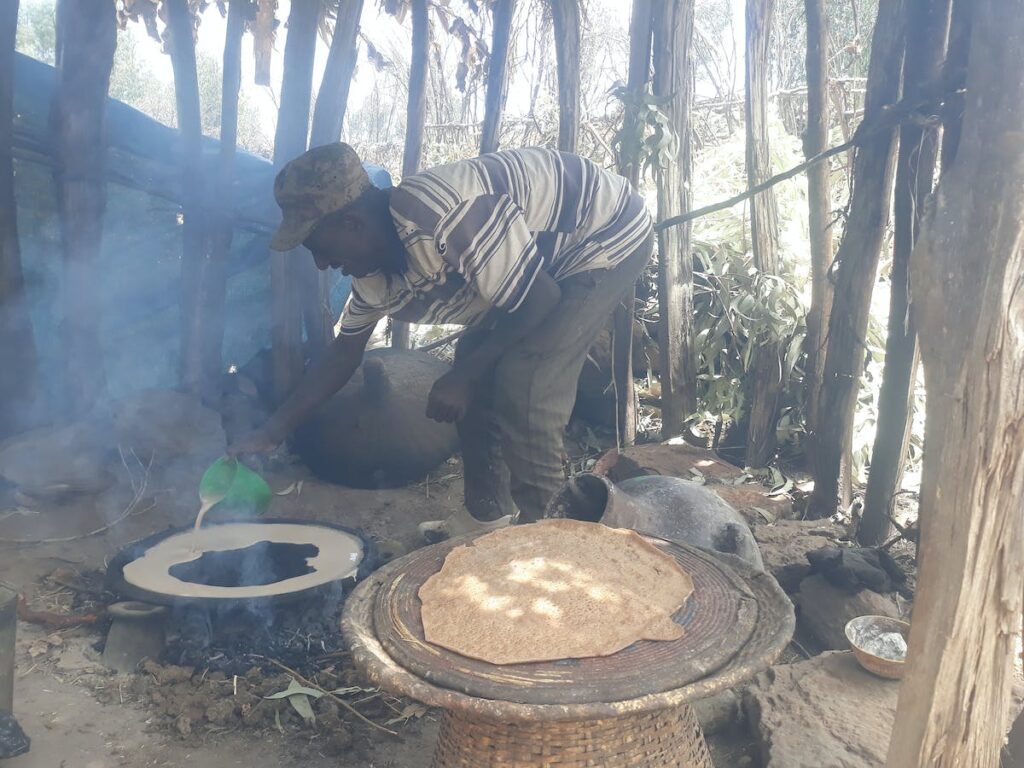Dagnaw, an Ethiopian husband and father of three, used to think he should never, ever walk into a kitchen. There is a saying in his culture: “The kitchen is a hiding place for a woman.”
Dagnaw’s viewpoint changed, however, when he and his wife Mulu started learning about gender equality – and how a lack of equity can hold families back from thriving.
This kind of awareness training – along with improved household hygiene methods, modern agricultural techniques, and so much more – is among the important ways that Food for the Hungry (FH) strengthens communities, making them more resilient to poverty and able to flourish.

Dagnaw says that before joining the training, there was no information available or discussion in his community about gender equity or gender equality. He and his wife Mulu knew only what they had observed all their lives: household chores were only for women, and only men could work in the fields.
Absence of Gender Equity Erodes Family
Lack of money or cooperation made their family life unpleasant as well as unproductive. Dagnaw made all major decisions for the family without consulting his wife. This, in turn, made her very angry. They were perpetually fighting with each other, and sometimes the arguments became physically violent.
There often wasn’t enough to eat, and eventually the three children had to quit school because there was no money to buy the required supplies or school uniforms.
A couple of years ago, Dagnaw’s wife became seriously ill, and the entire family was going hungry. All the children are boys, so only Mulu would cook.
A Recipe for Change
Dagnaw became angry with his sick wife for not being able to prepare meals. The young children had nothing to eat, even though there was food in the house. So, Dagnaw began by attempting to make coffee and bake bread. Soon he was trying his hand at cooking other things. He continued feeding his family until his wife fully recovered.
But then, even after Mulu was well, Dagnaw kept cooking, preparing various dishes for his family. But he carefully hid these activities from the rest of the community. He said he would have been ashamed and embarrassed if people knew he was doing this kind of work.
It was about this time in 2022 when FH began working in the community and offered training made possible by the USAID–funded Resilience Food Security Activity (RFSA). Among the sessions available – in addition to learning about better farming methods and preparing more nutritious food – was the gender education discussion group. Dagnaw reluctantly attended.
Men Learn About Gender Equity
Participants in the group learned that husbands and wives should work together and divide household duties equally. They also heard that it is acceptable for men to bake bread and make stew, while women can plough and harvest in the fields.

After the training, Dagnaw stopped being secretive about his contributions around the house. He even increased his participation in household chores. Mulu started helping him with agricultural activities. Now, when Dagnaw travels to a town in search of daily labor work, Mulu covers the farming needs. And when she attends social gatherings or skill training at the community center, Dagnaw cooks, cares for their sons, and handles other needs around the house.
A Better Approach
Working and strategizing together has made all aspects of life easier and more successful, they say. Ultimately, it has enabled them to improve their income significantly. Their children were able to meet financial requirements and return to school.

Today, Dagnaw understands much more about what it means to be a good father and husband. The family is much more stable, and any tendencies toward violence borne of frustrations have been eliminated. The entire family enjoys working together.
“I understand now that the only work nature limits me from doing is pregnancy and breastfeeding,” said Dagnaw.
Strengthening Community
He has begun to teach other men in the community and encourage them to participate in household tasks by sharing his experience. Most importantly, Dagnaw and Mulu are raising their sons to look at family life in a positive new way.
You May Also Enjoy These Posts:
Farmers Grow Better Together in Rwanda


